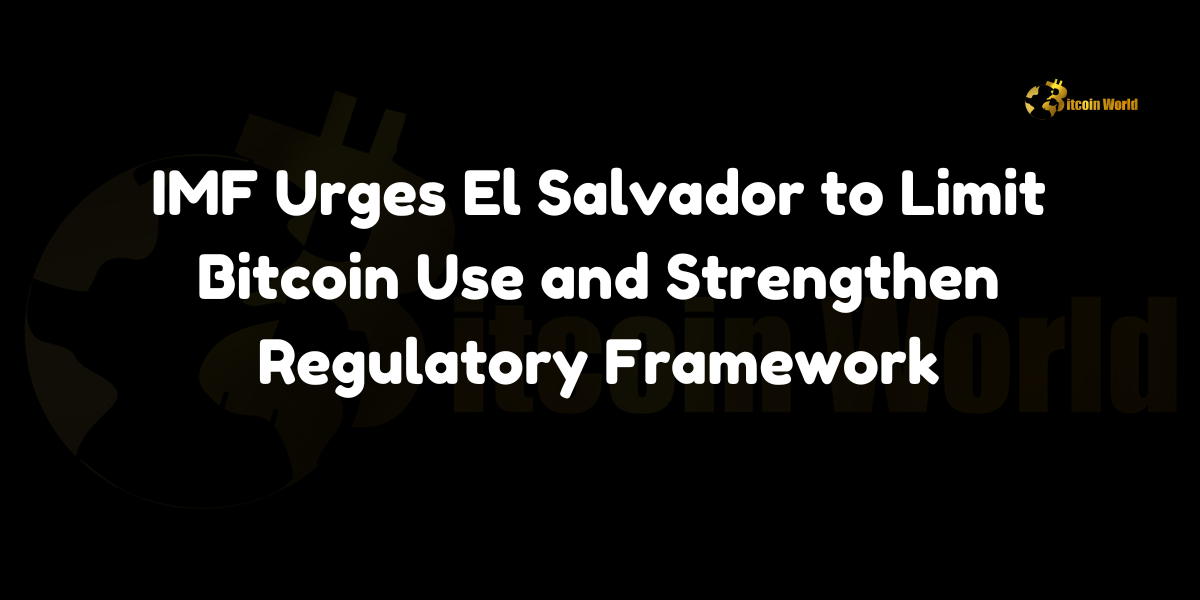IMF Urges El Salvador to Limit Bitcoin Use and Strengthen Regulatory Framework
The International Monetary Fund (IMF) has called on El Salvador to scale back its Bitcoin policies, urging the country to narrow its Bitcoin Law, strengthen regulation, and reduce public sector exposure to the cryptocurrency, according to Cointelegraph. This comes after El Salvador became the first nation to adopt Bitcoin as legal tender in 2021, a move that has drawn global attention and sparked debate over the role of cryptocurrencies in national economies.
The IMF continues to advocate for traditional financial systems and is promoting central bank digital currencies (CBDCs) through its REDI framework, which emphasizes Regulation, Enforcement, Data collection, and Information sharing as key components for managing digital currencies.
IMF’s Recommendations for El Salvador’s Bitcoin Policies
In its recent statement, the IMF outlined several recommendations for El Salvador to mitigate potential risks associated with its Bitcoin adoption:
- Narrow the Scope of the Bitcoin Law: The IMF has suggested that El Salvador should consider narrowing its Bitcoin Law, which currently mandates Bitcoin acceptance as a form of payment. A more limited scope could reduce risks associated with the volatility and unpredictability of Bitcoin, particularly for those who may not fully understand or wish to engage with the cryptocurrency.
- Strengthen Regulation: The IMF is urging El Salvador to bolster its regulatory framework for Bitcoin, ensuring that safeguards are in place to protect consumers and the financial system. This could include measures to prevent money laundering, fraud, and other illicit activities that could arise from Bitcoin’s decentralized nature.
- Reduce Public Sector Exposure: The IMF has recommended that El Salvador reduce its public sector exposure to Bitcoin, likely in response to the country’s significant investments in Bitcoin holdings. By reducing exposure, the IMF suggests that El Salvador could avoid the risks associated with Bitcoin’s price volatility, which could impact national finances if the value of Bitcoin were to decline sharply.
El Salvador’s Bitcoin Journey: A Brief Overview
El Salvador made headlines in September 2021 when it became the first country to adopt Bitcoin as legal tender, alongside the U.S. dollar. President Nayib Bukele has been a strong advocate for Bitcoin, framing it as a way to increase financial inclusion, attract investment, and reduce dependence on the U.S. dollar.
Since the adoption, the government has implemented initiatives like the Chivo Wallet, a state-backed digital wallet that allows citizens to store and transact with Bitcoin. El Salvador has also invested in Bitcoin through government purchases and initiatives like the proposed Bitcoin City, which aims to create a hub for Bitcoin mining and innovation.
The IMF’s Position on Cryptocurrencies and CBDCs
The IMF has consistently expressed concerns about countries adopting cryptocurrencies as legal tender, particularly due to the volatility and regulatory challenges they present. While the IMF recognizes the potential benefits of blockchain technology, it generally favors central bank digital currencies (CBDCs) over cryptocurrencies like Bitcoin. Through its REDI framework, the IMF is promoting a structured approach to managing digital currencies, focusing on Regulation, Enforcement, Data collection, and Information sharing.
The IMF’s advocacy for CBDCs reflects its preference for digital currencies that can be controlled and regulated by central banks, as opposed to decentralized assets like Bitcoin, which can be more difficult to regulate and pose greater challenges for traditional financial systems.
El Salvador’s Response and Future Prospects
El Salvador has continued to embrace Bitcoin despite the IMF’s repeated recommendations to limit its use. President Bukele has publicly dismissed some of the IMF’s criticisms, viewing Bitcoin as a strategic tool for economic growth and financial inclusion. However, the IMF’s calls for tighter regulation and reduced Bitcoin exposure may resonate with segments of the population who are concerned about financial stability and the potential risks of Bitcoin’s volatility.
As El Salvador moves forward, it remains to be seen whether the government will adjust its Bitcoin policies in response to the IMF’s recommendations or continue to pursue its unique approach to cryptocurrency adoption.
Conclusion
The IMF’s recent call for El Salvador to scale back its Bitcoin policies underscores the ongoing tension between traditional financial institutions and cryptocurrency adoption. While El Salvador continues to push forward with Bitcoin as part of its national economy, the IMF remains cautious, advocating for narrower laws, stronger regulation, and a focus on CBDCs rather than decentralized cryptocurrencies.
As the debate over Bitcoin’s role in national economies continues, El Salvador’s experience may serve as a case study for other countries considering similar moves. The IMF’s recommendations reflect broader concerns about the challenges and risks associated with adopting cryptocurrencies as legal tender, highlighting the need for balanced approaches to digital currency adoption.
To learn more about the innovative startups shaping the future of the crypto industry, explore our article on latest news, where we delve into the most promising ventures and their potential to disrupt traditional industries.
Disclaimer: The information provided is not trading advice, Bitcoinworld.co.in holds no liability for any investments made based on the information provided on this page. We strongly recommend independent research and/or consultation with a qualified professional before making any investment decisions.




